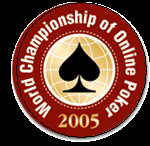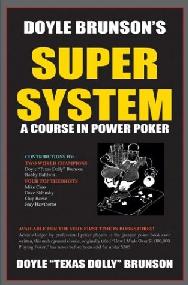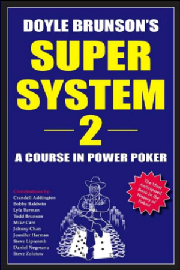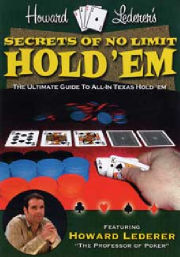|
|


|
POKER STARS : 2005 WCOOP
$2 500 000 GUARANTEED
$2500+100 ENTRY FEE
SEPT 18, 2005 : 4:30PM ET
*NO LIMIT HOLDEM
|
POKER STARS : 2005 WCOOP
$1 000 000 GUARANTEED
$1000+50 ENTRY FEE
SEPT 11, 2005 : 4:30PM ET
*NO LIMIT HOLDEM
|
POKER STARS : 2005 WCOOP
$800 000 GUARANTEED
$500+30 ENTRY FEE
SEPT 4, 2005 : 4:30PM ET
*NO LIMIT HOLDEM
|
POKER STARS : 2005 WCOOP
$700 000 GUARANTEED
$1000+50 ENTRY FEE
SEPT 13, 2005 : 3:00PM ET
*NO LIMIT HOLDEM
|
POKER STARS : 2005 WCOOP
$700 000 GUARANTEED
$200+15 ENTRY FEE
SEPT 8, 2005 : 3:00PM ET
*NO LIMIT HOLDEM (REBUYS)
|
POKER STARS : 2005 WCOOP
$400 000 GUARANTEED
$1000+50 ENTRY FEE
SEPT 17, 2005 : 3:00PM ET
*LIMIT HOLDEM
|
POKER STARS : 2005 WCOOP
$350 000 GUARANTEED
$500+30 ENTRY FEE
SEPT 10, 2005 : 3:00PM ET
*POT LIMIT HOLDEM
|
POKER STARS : 2005 WCOOP
$250 000 GUARANTEED
$500+30 ENTRY FEE
SEPT 16, 2005 : 3:00PM ET
*POT LIMIT OMAHA
|
POKER STARS : 2005 WCOOP
$250 000 GUARANTEED
$500+30 ENTRY FEE
SEPT 14, 2005 : 3:00PM ET
*LIMIT OMAHA HIGH/LOW
|
POKER STARS : 2005 WCOOP
$200 000 GUARANTEED
$200+15 ENTRY FEE
SEPT 5, 2005 : 3:00PM ET
*POT LIMIT OMAHA (REBUYS)
|
POKER STARS : 2005 WCOOP
$200 000 GUARANTEED
$200+15 ENTRY FEE
SEPT 6, 2005 : 3:00PM ET
*NO LIMIT HOLDEM
|
POKER STARS : 2005 WCOOP
$200 000 GUARANTEED
$200+15 ENTRY FEE
SEPT 7, 2005 : 3:00PM ET
*POT LIMIT HOLDEM
|
POKER STARS : 2005 WCOOP
$150 000 GUARANTEED
$200+15 ENTRY FEE
SEPT 9, 2005 : 3:00PM ET
*NO LIMIT HOLDEM
|
POKER STARS : 2005 WCOOP
$150 000 GUARANTEED
$300+20 ENTRY FEE
SEPT 12, 2005 : 3:00PM ET
*SEVEN CARD STUD
|
POKER STARS : 2005 WCOOP
$150 000 GUARANTEED
$500+15 ENTRY FEE
SEPT 15, 2005 : 3:00PM ET
*SEVEN CARD STUD HIGH/LOW
|
|

|
MONTE CARLO MILLIONS
$3 000 000 GUARANTEED PRIZE POOL
$1 000 000 1ST PLACE
|
|
|
|
|
|
|
|
|
|
|
VIA PRIMA NETWORK SATELLITE OR INVITATION
|
|
|
SPEND 2006 AS A PAID POKER PRO
|
|

SUPER SYSTEM
DOYLE BRUNSON
|
|
|

SUPER SYSTEM II
DOYLE BRUNSON
|
|
|

SECRETS OF NO LIMIT HOLDEM
HOWARD LEDERER
|
|
|
1- Texas Holdem Starting Hands
The first thing a Holdem player should learn is which cards are
worth playing, and which should be folded. Many beginning players stay in a hand with cards that have little or no future,
and it ends up showing in their chip count.
2- The Importance of Seat Position
So you are sitting at a $3/$6 Hold'em table, and the
cards are dealt. You decide that with your hand, it is worth $3 to see the flop. You call. The next two players fold, the
following player raises. Now you decide that it isn't really worth $6 to see the flop, and you wish you had never placed a
bet in the first place.
3- Reading the Board
Good Hold'em players can 'Read the Board', and they know what hands might be lurking out there at the table
ready to show themselves and take the pot. They also know what hands can not be possible, and so they know not to worry defending
against them.
4- Bluffing
In poker it's not only what's in your hand that counts, but
also what people think is in your hand. If you bet as though you have good cards, other players just may believe you do have
good cards. Therein lies the essence of bluffing.
5- The Odds of Making Your Hand
In the game of Hold'em there are plenty of times you will need
a card to show itself on the flop, turn, or the river. For instance, you may need to know the odds of catching that club on
the river for the flush, or flopping the third 8 to go with the two in your hand. In order to compute the odds of finding
the card you need on the board, you will need to know two things...
6- Pot Odds What are Pot Odds and what should you know about them?
Starting hands in Texas Holdem
The first thing a Holdem player should learn is what cards to play,
and what cards to fold! Many beginning players stay in a hand with cards that have little or no future. The best tip for players
new to Texas Holdem is FOLD A LOT! Next thing to remember is that no two cards are unbeatable, and if the flop does not add
any value to your hole cards, or make it possible to get the best possible hand, you should fold after the flop.
The best starting hands are:
Large Pairs - Aces, Kings, Queens, Jacks. Even pairs of tens and
nines and eights are high quality starting hands. Play them.
Aces with suited High Cards - When you get an Ace with a K,Q,J,
or even a ten, many good things can happen. You already have high card. If a flush comes, you'll have the best possible one
because of your ace. High straights, and even a straight flush is possible with these cards. Play them.
Suited Faces Cards and Tens-While it's nicer to have an ace, suited
face cards are playable hands. They hold lots of potential, high pair with a strong kicker,straights,and flushes.
Aces with unsuited High Cards - Aces with an unsuited partner can
still give you top pair with a high kicker, or a high straight. Because other players may also have an ace, the strength of
the second card in your hand is important. If two players tie, that second card, or 'kicker' will decide the winner. This
is why A-10 is a playable hand, and A-6 is not. (A-10 can also turn into a high straight). So while aces are highly sought
after, do not feel the need to play every hand in which you are dealt an ace.
King with Face Card -A King with a Queen, or Jack is a playable
hand. But, it is not as strong as you may think. Still, two face cards rank high enough that seeing the flop is a good idea.
These are the strongest starting hands in Texas Holdem. Other hands
are playable depending on the circumstances at the table, but beginners may want to stick to playing only these premium hands
until they understand the game more fully. Playing these hands will not guarantee that you will be a winner. Poker doesn't
work that way. Even pairs of Aces get beaten. But, if you want to win a pot, finding any of the cards listed on the chart
in your hand is a good place to start.
The Importance of Seat Position
So you are sitting at a $3/$6 Hold'em table, and the cards are
dealt. You decide that with your hand, it is worth $3 to see the flop. You call. The next two players fold, the following
player raises. Now you decide that it isn't really worth $6 to see the flop, and you wish you had never placed a bet in the
first place. That is difference table position makes. Had you already known someone was going to raise, you would've saved
three dollars that hand by simply folding. Knowing what your opponents are going to do makes a difference.
A full Hold'em table is broken into three pieces. The first three
players are said to be in Early Position. They must act before most of their opponents. Because they are acting first, players
in early position should avoid playing marginal hands. After all, there are up to nine more hands at the table to contend
with. Instead, players in early position should limit themselves to playing only premium hands.
The next set of players at the table are said to be in Middle Position.
They have seen some of their opponents act, so they have an idea of what they are up against. If no one has raised, players
in middle position do not need to limit themselves to only the premium starting hands. Another advantage of middle position
is that there are fewer players who have not acted, and so the chances that someone will raise you are lower.
The last set of players are said to be in Late Position. They have
the advantage of having seen most of their opponents already act. The very last player to act has the most advantage that
table position can offer. They have seen everyone act and should they decide to call a bet there is no chance of someone raising
them. Players in late position can play a wider range of starting hands because they already know how many opponents they
will be facing.
The general guide is to play very tight in Early Position sticking
to only the best starting hands. In Middle Position play good starting hands, but they need not be the very best. In Late
Position players can afford to play more loosely.
Of course there are different betting strategies that can be used
depending on your table postion and the actions of your opponents, but the first thing to understand is that where you are
seated in relation to the dealer makes a difference. You can improve your game right away by simply paying attention to your
table position.
Reading the Board
Good Hold'em players can 'Read the Board', and they know what hands
might be lurking out there at the table ready to show themselves and take the pot. They also know what hands can not be possible,
and so they know not to worry defending against them.
How can you tell what hands are possible, and what ones are not?
Here are some simple guidelines to get you started.
Pairs on the Board - if there are a pair of cards on the board,
someone may have a Four-of-a-Kind. If there are no pairs on the board, no one can have a Four-of-a-Kind.
Pairs on the board also make a Full House possible. Both of these
hands are very strong, so when the board pairs pay attention. Someone may be holding a monster hand.
Three of a Suit - is what is necessary for a flush. Sometimes when
the suited community cards are not particularly impressive, say 2-7-9 of clubs, it becomes easy to overlook the potential
flush in your opponents hands.
Sequence Cards - the cards that make a straight possible. If the
cards on the board only have two 'holes' in a string of five consecutive cards, someone may be holding those cards and just
may have that straight. So, when cards like 9-J-Q show themselves on the board, beware that an opponent may be holding the
'missing' 10-K in their hand.
Of course you know what cards are in your hand, and that can help
you deduce what cards your opponents may have.
Bluffing
Sometimes nothing can be a very cool hand!
In poker it's not only what's in your hand that counts, but also
what people think is in your hand. If you bet as though you have good cards, other players just may believe you do have good
cards. Therein lies the essence of bluffing.
Of course there are good times to bluff and bad times as well.
Here are a few insights into bluffing:
Don't:
- Bluff bad players. Bad players don't necessarily know when they
are beaten. So even though you may present yourself as having the stronger hand, they simply may not notice or may not care.
- Expect bluffs to work in low limit hold'em. If the cost to see
your cards is not significant, why should your bet (or raise) keep anyone from paying to see them?
- Try to bluff many players. You may fool some of them, but if
you don't fool everyone you are in trouble.
Do:
- Bluff when the board says "someone" might have made a good hand.
An example is when the third of a suit hits the board. "Someone" might have a flush. If you bet as if you have the flush,
the other players may believe you do.
- Bluff against good or tight players. If you are in a pot with
a player that looks for a reason to fold, give them one. Try betting big and making them think you have something they cannot
beat.
Bluffing is something that is done between players, so the more
you know your opponent's habits the better. If a player is a 'calling station' and always calls the bet so they can get to
the next card or see the showdown, don't bother trying to bluff them.
If players have caught you bluffing recently, they will remember
it. If you try to bluff again too soon do not be surprised if someone calls you, just to 'keep you honest'. Of course this
can be used to your advantage. If you find yourself with good cards right after being caught bluffing, you are more likely
to have players call your bets, rewarding you with a bigger pot.
Some circumstances have risen as 'typical' bluffing situations.
They can be used to your advantage, but veteran players may recognize the play and use it against you.
Typical bluffs include:
- Sitting in late position pre-flop. Everyone folds before you.
You then bet big, knowing that there are only two players competing against you and that they didn't bet because they liked
their hand. They bet because they had to. The players may interpret your big bet as a sign of strength and simply fold. You
will have "stolen the blinds".
- Betting big from last position after everyone else has checked.
You can interpret their checks as a lack of confidence in their cards. They may interpret your bet as a strong hand and fold.
Bluffing is an art, and it spices up the game of poker. Make bluffing a part of your arsenal, but not your only weapon at
the poker table.
The Odds of
Making Your Hand
In the game of Hold'em there are plenty of times you will need
a card to show itself on the flop, turn, or the river.
For instance, you may need to know the odds of catching that club
on the river for the flush, or flopping the third 8 to go with the two in your hand. In order to compute the odds of finding
the card you need on the board, you will need to know two things. The first is how many 'Outs' you have.
'Outs' are simply the number of cards that can 'make' your hand.
If you are looking for that flush on the river, there are 9 cards that can help you. (13 clubs in the deck - 4 clubs in your
hand or on the board = 9 clubs remaining).
The second thing to know is the number of unseen cards. Since two
cards are in your hand, and four are on the board, there are 46 card remaining. (52-2=50 followed by 50- 4=46).
Now computing the odds is a simple division problem. 9 cards that
can help, divided by 46 cards out there, equals 19.6%. (9÷46=19.56%). That's how you do it. Ok, 9÷46 isn't so simple, but
still, that's how it's done.
Information you can use right away:
• Flush: If you hold a four flush, the odds of catching it
on the turn are 19.1%, on the river is 19.6%. Catching it on the turn or the river is 35.0%
• Open-Ended Straight: Odds of catching your card on the
turn, 17.0%. On the river, 17.4%. On the turn or the river, 31.5%
• Gutshot Straight: Catching your card on the turn, 8.5%.
Catching your card on the river, 8.7%. Catching it on the turn or the river, 16.5%
• Trips: Turn your pair into Three-of-a-Kind on the turn,
4.3%. Catch at the river, 4.3%. Catch at the turn or the river, 8.4%. With pocket pairs it is more likely you'll want to catch
on the flop. Odds of that are 11.8%
Pot Odds
What are Pot Odds and what should you know about them?
Well, Pot Odds is the ratio of what is already in the pot to the
amount you would have to bet to stay in the hand. So, if there are $36 in the pot, and you would need to bet $6 to stay in
the hand, the pot odds are 36 to 6, or 6 to 1.
Why would you need to know this?
One example of using pot odds is when your hand is not yet the
best hand at the table, but it could be if the right card comes up next. For instance, with four cards on the board you hold
four clubs. The odds of completing the flush on the river are roughly 5 to 1 against you. That means for you to bet there
should be at least five times the bet amount in the pot. If the bet to you is $2, then there should be at least $10 in the
pot to make it worth calling.
Suppose there were $24 in the pot when you were making that decision.
The odds of landing that club and getting the best hand at the table were 5 to 1. The pot would pay you 12 to 1 on your bet.
That makes calling the bet the right decision to make. You may not land your club and win the hand, but over the long run
playing this way will be to your advantage.
Another instance of using pot odds is after the river, when the
final bet comes to you. If the pot holds $40, and the bet in front of you is $4, you can use pot odds to decide what to do.
The pot is laying you Ten to One odds. ($40 against your $4 bet). Even though you feel your opponent may have the better hand,
do you think he is ten times more likely to have a better hand? If so, fold. If not, call the bet and see his cards.
There are plenty of times at the poker table when you will be asking
yourself, "Is it worth staying in this hand?". Being able to use pot odds will help you answer that question correctly more
often.
|
|
Quotes & Tips From The Pros
|
"Lack of patience and self-discipline are the downfall of many players
who otherwise are technically sound enough to be winners."
Doyle Brunson, Super System
"The decisions you make on the Flop are by far the most important."
Doyle Brunson, Super System
"Be straightforward...not fancy...in your betting tactics. Some hands
you get will virtually play themselves. Your ability to make the most, or lose the least, with one Pair will probably be the
difference between winning and losing."
Doyle Brunson, Super System
"It comes to a point where you have to take a chance. If you want
to be a winner."
Doyle Brunson, Super System
"You should never start out bluffing at a pot and keep bluffing at
it without an out."
Doyle Brunson, Super System
"You can't play winning poker by playing safe all the time. You must
take chances...gamble."
Doyle Brunson, Super System
"You should constantly be trying to get as much value for your hand
as you can. And the way you do that is to bet."
Doyle Brunson, Super System
"Often you can tell just from the way a man bets, whether
he has a strong hand or a weak hand , it's all in the motion."
Mike Caro, Pro Poker Tells
"Players often stack chips in a manner directly indicative of their
play. Conservative means conservative: sloppy means sloppy."
Mike Caro, Pro Poker Tells
"Players staring at you are usually less of a threat than players
staring away."
Mike Caro, Pro Poker Tells
"Play the top ten hands only for a while, get yourself comfortable,
get yourself used to the game. As you advance as a player you can start playing the majority play hands."
Phil Hellmuth, Online Poker Secrets
"Remember to always raise. Do a lot of raising to find out
where you're at. Raise to find out if your hand is the best hand or not. Raise to try to win the pot. Once you've learned
the information, once you've learned where you're at through raising, make sure that you follow through. If you've learned
that you're beat...fold, if you've learned that you have the best hand...continue to play and bet."
Phil Hellmuth, Online Poker Secrets
"It's very important that when your opponent has a drawing hand that
misses to allow them to bluff to you."
Howard Lederer, Secrets Of No Limit Holdem
"Very often you can catch a big bluff on the river, not by anything
your opponent did on the river, but by how he was betting his hand earlier in the pot."
Howard Lederer, Secrets Of No Limit Holdem
"Don't look at your cards until it's your turn to act"
Howard Lederer, Secrets Of No Limit Holdem
"If you practice reading people, you will become a better poker psychologist."
Howard Lederer, Secrets Of No Limit Holdem
"Find the few friends in your group that are really into the game
and start sharing ideas amongst eachother, and you're gonna find your game improving very quickly."
Howard Lederer, More Secrets Of No Limit Holdem
"Mix up your play and become a dangerous unpredictable player."
Howard Lederer, More Secrets Of No Limit Holdem
|
|

|
|

